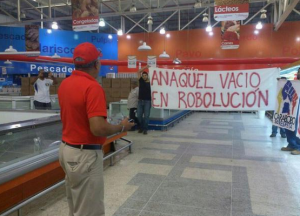Amid Shortages, Venezuela Forces All Food Distribution into State Hands
Industry Chamber President Sounds the Alarm over Further Government Intervention
0 Sidenotes
EspañolWhat began as rumors of state meddling in the food-distribution market in Venezuela were finally confirmed on Monday. The Nicolás Maduro government is compelling the country’s food producers to send up to 100 percent of their output to state-owned distribution centers and stores, in an attempt to solve the nation’s shortage problems.+
This according to Pablo Baraybar, president of the Venezuelan Food Industry Chamber (CAVIDEA), who explained that the National Agro-Food Superintendency — a governmental entity in charge of managing food distribution in the country — has ordered affiliated firms to send the majority of their products to PDVAL, MERCAL, Bicentenario supermarkets, and other establishments of the state-run network.+
In Venezuela, the national government manages the distribution of food. It’s the executive, through the ministries, who decides which stores in what part of the country will get the products.+
Baraybar, however, believes the measure will make the scarcity problem even worse. He claims the network of private supermarkets has 15 times more establishments than the state: 113,000 private stores all over the country versus 7,245 that are state run. This means the government plans to give most of the food to the smaller sector of the national distribution network.+

Protesters inside a state-run Bicentenario supermarket in Valencia, Venezuela. (Trompoaldía)
The expropriation of private firms in Venezuela first began over 10 years ago, and 230 food companies are now in the hands of the state. However, the private sector still produces 80 percent of the food sold through the state network.+
“If all the expropriated industries were operating at full capacity, we would be able to provide the state network without having to reduce the supply to the private sector,” Baraybar said.+
The CAVIDEA president warns that this new policy will not solve the shortage problem, nor will it help curb the so-called bachaqueo — the resale of products at a substantial markup in the black market.+
“Diverting production [to the state network] is not the answer. CAVIDEA has always proposed that the solution is to increase production,” Baraybar said. “Sixty-seven percent of the bachaqueo occurs in large [distribution] channels, be it public or private. The more production is diverted, the more we are enabling the bachaqueo.”+
On Wednesday, July 22, Food Minister Carlos Osorio denied Baraybar’s claims that the government is rerouting food to favor the state’s distribution centers. According to Osorio, the Food Ministry merely seeks a “balanced distribution” of products.+
Venezuela’s Inflation Spiraling Out of Control
According to a survey conducted by the Venezuelan consulting firm Datanálisis in June, scarcity in the state-distribution network has reached a staggering 80 percent in at least one store, MERCAL (Mercados de Alimentos, C.A.).+
In May, 60.7 percent of basic foodstuffs in Caracas were afflicted by shortages, and this week, the South American country woke up to the news that the cost of a basic basket of goods rose to 54,204 Bs. — eight times the federal minimum wage.+
The few products that Venezuelans can get their hands on have increased in price by roughly 27 percent in a single month. The Documentation Center for Social Analysis (Cendas-FVM) called the price spike in May a “historical increase … that could signal the beginning of hyperinflation.”+
Government Doubles Down on “Economic War” Rhetoric
Even though the national government controls the production, distribution, and sale of goods in Venezuela, President Maduro says the private sector’s “economic war” is to blame for the country’s crisis.+
The Venezuelan government has also instituted strict currency controls since 2003, leaving many firms without the US dollars necessary to pay for imports. Baraybar says production plants in the food industry are grinding to a halt over the government’s delay in assigning foreign-currency quotas. The sector’s debt with foreign suppliers has reached US$1.4 billion, he claims.+
Venezuela’s largest business union, Fedecámaras, says the country’s the private sector has become highly dysfunctional as a result of state intervention.+
“The vast majority of businesses have serious inventory problems and do not have the capacity to refill their supplies, because they cannot sell and earn adequate profits,” said Francisco Martínez, head of Fedecámaras.+
Martínez also stressed the importance of eliminating stifling regulations, such as the Fair Prices Law that limits profits to 30 percent above costs, which he calls “an infringement on [constitutional] economic liberties.”+

No comments:
Post a Comment